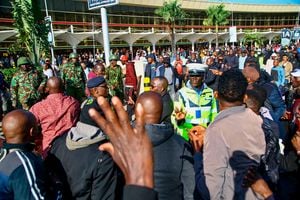Case of mistaken identity or sheer incompetence?

Columnist Macharia Gaitho
Imagine this: you’re followed from your home by unknown individuals. Your 19-year-old son, who is driving, decides to head to the one place that should offer you protection, the police station. Instead, upon arrival, you are roughed up and arrested. This was the ordeal veteran journalist Macharia Gaitho and his son endured on Wednesday morning.
Thankfully, his son recorded a video of the incident, prompting a massive public outcry that led to Gaitho’s release. The National Police Service later claimed in a statement that it was a case of mistaken identity.
Kenyans are questioning this explanation and the competence of the police in their investigations, highlighting the lack of due process during arrests. Many report that the police failed to identify themselves properly and used excessive force, contravening the Constitution, as well as regional and international human rights laws. Numerous abductees have been handcuffed, blindfolded, and tortured. Since the protests began, over 200 people have been arrested and more than 50 people have lost their lives.
One would expect the justice system to seize this moment to correct its course, regain public trust, and respect the rule of law. Instead, we see more killings, illegal arrests, detentions beyond 24 hours without just cause, and torture. Gaitho’s arrest, allegedly due to mistaken identity, exemplifies the rot, lazy investigations, and disregard for due process within the National Police Service.
A simple reading of Article 49 of the Constitution, the Criminal Procedure Code Act Cap 75, and the Police Service Act Section 58, which outline the procedures for arrest and the use of force, reveals blatant disrespect for the law.
Citizens have documented the officers involved in illegal arrests and abductions, as well as the vehicles used, yet no action has been taken. Killer cops, previously seen using live bullets during protests, continue to operate openly on the streets during subsequent demonstrations.
Kenyans have lost faith in the Independent Policing Oversight Authority, tasked with investigating police misconduct. Their poor track record in handling reported cases and securing successful prosecutions has earned them the reputation of a toothless dog.
While the government calls for dialogue, basic obedience to the law must be demonstrated to show goodwill. This includes allowing peaceful protests as provided by law, with police protecting protesters, arresting rogue officers, following due process during arrests, and taking accountability.
Without tangible steps to obey the rule of law and respect human rights, there can be no meaningful dialogue. Resignations and firings are insignificant when the status quo remains unchanged.
Only through genuine commitment to justice and reform can Kenya hope to overcome this crisis and build a society where the rule of law is respected, and every citizen’s rights are protected.
Ms Mutua is an advocate of the High Court and a human rights practitioner. [email protected]





